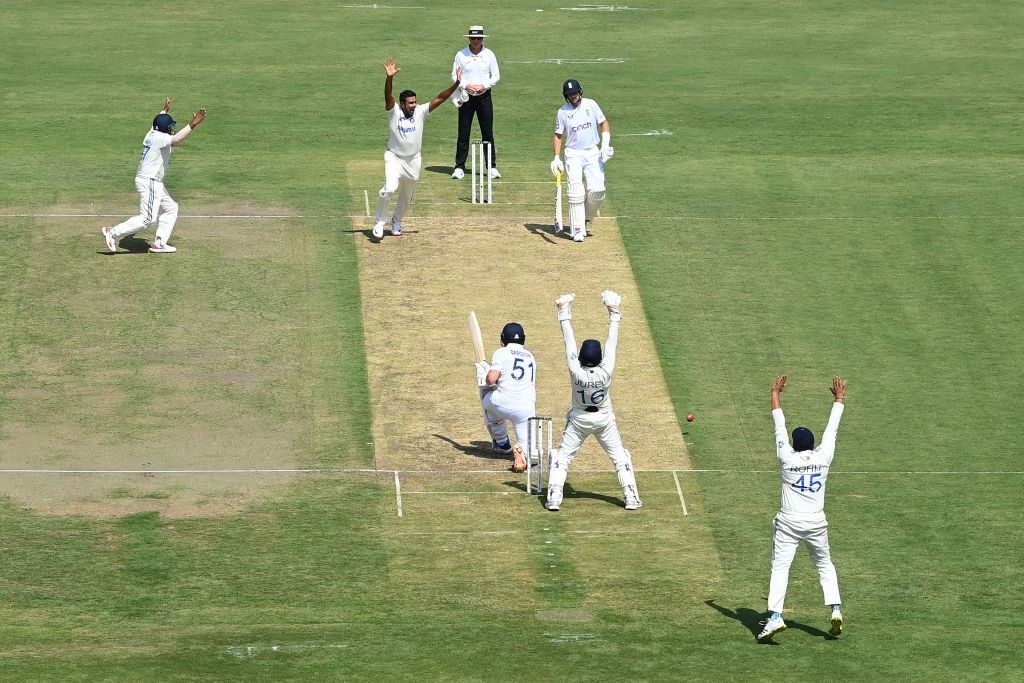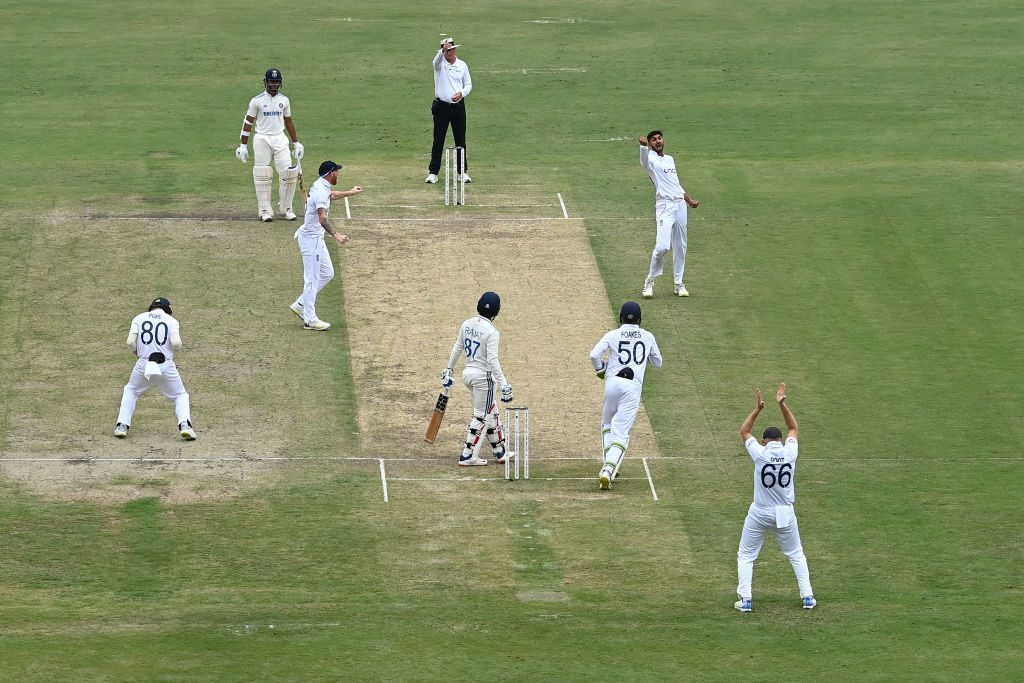
R Ashwin‘s form has been underwhelming in the ongoing series against England. And now with rookie spinner Shoaib Bashir outperforming him, it could be worrying signs for India, writes Naman Agarwal from Ranchi.
Subscribe to the Wisden Cricket YouTube channel for post-match analysis, player interviews, and much more.
Ravichandran Ashwin’s bowling has been compared to an opposition off-spinner enough times in the last thirteen years. From Graeme Swann to Nathan Lyon to Moeen Ali: in a long career, Ashwin has naturally been out-bowled by his contemporaries on occasions, and has ended up facing severe and often unwarranted criticism.
On day two of the Ranchi Test, he was outshined by another. This time, however, there are justifiable concerns.
Shoaib Bashir, who bowled a grand total of 203 overs in his entire County Championship career before being selected for the India tour, operated unchanged for 31 overs from the North End of the JSCA International Stadium in his second Test match, ripping the heart out of the Indian batting order in the process and putting England in the ascendancy.
Picked for his “high release point” and the “natural attributes” he possesses over the bare numbers he had to show for in first-class cricket, Bashir proved that the art of selection does sometimes work over the science of selection, as Rob Key, England’s director of cricket, had argued when trying to explain Bashir’s inclusion in the squad.
On a surface that had cracks aplenty to exploit, Bashir, who was a bit all over the place on his Test debut in Vizag, kept things simple and zoned in on a spot, letting the crumbling Ranchi pitch do the rest, something which Ashwin failed to do on day one.
Ashwin had come into the attack in the 20th over on the first day, with the first three English wickets already down and the out-of-form middle order exposed. Having not found the kind of rhythm that is usually expected of him throughout the series, Jonny Bairstow rightly thought it would be a good idea to push the veteran spinner on the backfoot early on. A six and a four off his first seven balls ensued, but Ashwin was quick to take back control. Or so it seemed.
He had Bairstow lbw attempting to sweep a ball that sneaked under his bat in just his second over of the innings. Spinners usually take time to settle into a spell, and that has stood true for Ashwin as well all these years. An early wicket acts as a catalyst in that process. On this occasion though, Ashwin would go on to bowl 20 more overs and take no more wickets.
[caption id=”attachment_605349″ align=”alignnone” width=”1024″] Bairstow’s wicket was the only one that Ashwin took in the first innings in Ranchi[/caption]
Bairstow’s wicket was the only one that Ashwin took in the first innings in Ranchi[/caption]
With uneven bounce evident earlier than it ideally should be in a Test match, the plan must have been simple: attack the stumps, as Bashir showed on day two. Three of the four wickets he took were either bowled or lbw, while the fourth was a bat-pad catch off a delivery which was also on the stumps.
Identifying the nature of the conditions on offer, Rohit Sharma had delayed bringing on Kuldeep Yadav till the 42nd over on the first day, putting a premium on accuracy and giving ample opportunity to his finger spinners to hit the cracks. While Jadeja did his thing, Ashwin, ended up trying too much.
Constant changes in angles, trajectories, speeds and lengths meant he not only failed to make the most out of all the help that was readily available for him, but also gave the English batters an outlet from the relentless pressure that was being applied from the other end. His 22 overs fetched 3.77 runs per over (rpo), nearly twice that of Jadeja and Kuldeep, who combined to concede 2.01 rpo in the first innings. Bashir’s accuracy meant that he was hard to score off too, as he went at 2.62 rpo on day two.
Ashwin has had a quiet series by his standards. Seven innings have fetched him just 12 wickets at 38.83. Tom Hartley (18 wickets at 32.11), Jadeja (16 wickets at 23.62), Kuldeep (eight wickets at 31.12), and Bashir (eight wickets at 35) have all averaged lower than him. In fact, this is just the third time that Ashwin has averaged more than 30 with the ball in a home Test series: England being the opposition on each of those those three occasions.
[caption id=”attachment_605350″ align=”alignnone” width=”1024″] Bashir trapped Rajat Patidar lbw en route to his four-for on day two of the Ranchi Test. (Photo by Gareth Copley/Getty Images)[/caption]
Bashir trapped Rajat Patidar lbw en route to his four-for on day two of the Ranchi Test. (Photo by Gareth Copley/Getty Images)[/caption]
And now, Ashwin’s underwhelming outings in the series which were being covered up by the rest of the Indian attack so far, have been brought into the limelight by Bashir’s performance in the first innings in Ranchi.
After the second day’s play in the third Test of the series in Rajkot, Ashwin had said that he wasn’t particularly worried about his own bowling despite the numbers not stacking up like they usually do for him in a home Test series: “If I have to judge and see the way I am bowling, I wouldn’t be too flustered because they haven’t been able to hit me to different parts [of the ground], which is what will [worry me].”
Among the boundaries that he was hit for in the first innings in Ranchi, there were three sixes and a four towards mid-wicket, two fours between cover and point, and a four behind square on the leg side. While still not the entirety of the ground, that is a big enough range get him to start worrying if he were to follow his own words.
At the end of the second day’s play, India find themselves 134 runs behind England’s first innings total of 353 with just three wickets in hand. On a surface which has played “unexpectedly low” according to India’s bowling coach Paras Mhambrey, that is a deficit which might prove too big to overcome.
In hindsight, Ashwin’s first-innings spell has played a defining role in India being on the backseat, just as Bashir’s has played a defining role in England being in front.
Ashwin has been outbowled before in his career, but rarely has he been outbowled at home, and rarely has the one outbowling him been a 20-year-old rookie with a first-class experience of less than ten matches.
Having not missed a single home Test since his debut, Ashwin has been pushed into a corner for arguably the first time since the 2012 series against the same opposition – the last home Test series that India lost.
Like this series now, which has only three more opportunities left for him to make a comeback, at 37 years of age, time is not Ashwin’s ally, and India have reasons to be worried.








